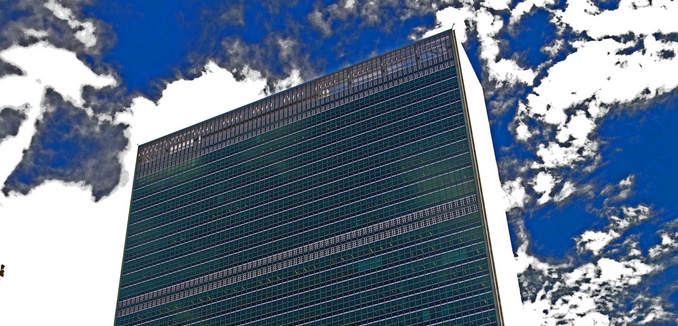Western Democracies should join the United States in exerting pressure on the United Nations “to shed its reputation for bloated, ludicrous hypocrisy and restore trust and credibility to international institutions,” former Israeli ambassador to the UN Ron Prosor wrote in Newsweek on Wednesday.
Prosor credited newly-installed United Nations Secretary General António Guterres and United States ambassador to the UN Nikki Haley for taking a principled stand against a report, written by two anti-Israel activists and issued by the UN Economic and Social Commission for Western Asia (ESCWA) last week, which slandered Israel as an “apartheid state.” Haley unconditionally condemned the report. Guterres first distanced himself from the document, then demanded that ESCWA remove it from its website. ESCWA, which represents 18 Arab nations, removed the report accordingly, though the agency’s head Rima Khalaf resigned in protest. She had two weeks left in her term.
Prosor called the chain of events a “rare” instance of good news from the UN, and pointed out that he had previously pushed for Khalaf to be fired in 2014, when she published a report comparing Israel to Nazi Germany.
However, “it will take more than one resignation to bring real change” to the UN, Prosor wrote.
Rima Khalaf was not a bad apple—there are more in the barrel—like Leila Zerrougui, Under-Secretary-General for Children and Armed Conflict, who turns a blind eye to Assad’s barrel bombs while condemning Israel’s attempts to defend itself. Or Christopher Gunness, Chief Spokesperson for the United Nations Relief and Works Agency for Palestine Refugees in the Near East (UNRWA), whose schools have been used by Hamas to store weapons.
Prosor also singled out the United Nations Human Rights Council (UNHRC), observing that the “paradoxically titled” agency fully embodied the UN’s failings. He praised the U.S. for boycotting the UNHRC’s discussion of Israel earlier this week.
“At every meeting of the Council, Israel is the only country debated under its very own agenda item,” Prosor explained. “Between 2009 and 2016, the UNHRC adopted 42 resolutions under Agenda Item Seven, which deals solely with Israel, and only 58 resolutions under Agenda Item Four, which deals with the rest of the world.”
This built-in bias means that the “council comprising some of the most brutal human rights abusers in the world, such as Saudi Arabia, Qatar and Venezuela, condemns the Middle East’s only democracy with such disproportionate zeal,” Prosor noted.
“At the Human Rights Council, other democratic states can take inspiration from America’s principled stance,” he concluded. “Now, instead of leading from behind, they can join the U.S. in leading from the front. European members of the Council, including major powers like the U.K. and Germany, should defend their stated values of fair play with renewed confidence.”
Haley isn’t the only U.S. official fighting against the UN’s anti-Israel bias. Last week, Rex Tillerson made clear that the U.S. would withdraw from the UNHRC if it did not reform.
In an op-ed published in The Wall Street Journal last month, Prosor advocated three steps that Congress could take to enact change at the UN.
The first: Improve transparency by appointing a delegate to the UN’s budgetary committee, ensuring that American money is spent for proper purposes. The UN currently has no obligation to provide detailed spending reports that comply with international accounting standards. “That’s not good enough for a small business filing its taxes,” Prosor observed. “For an organization spending billions[,] it’s ridiculous.”
Next, the United States should ensure that the UN acts in accordance with its principles. For example, the UN Human Rights Council has been “hijacked by human-rights violators like Cuba, Qatar, Saudi Arabia and Venezuela,” Prosor noted. Congress should work with an independent investigator to ensure that “that U.N. agencies are upholding their mission statements in keeping with U.S. standards, interests and values.”
Finally, if the UN or one of its subsidiary agencies continues to act in ways that are “lackluster, inefficient, corrupt or abhorrent, America could demand rapid reform,” and perhaps even withdraw funding.
[Photo: Mike Steele / Flickr ]




